合同法英语
法律英语课件-CONTRACTLAW(2017年)合同法
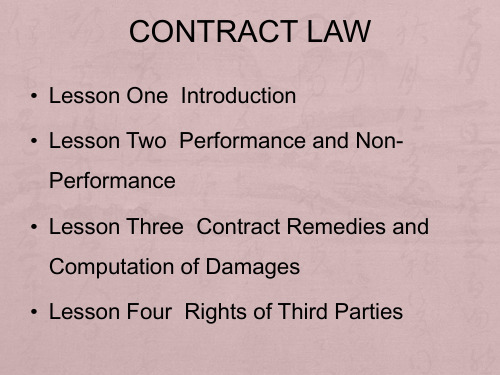
• 3.Necessary Elements of a Contract
• (1) There must be an agreement between the parties;
offeror by proper assent
Termination of Offer
Termination by Offeree • Rejection
– Not terminated by inquiries or request for different terms
• Counter-offer • Expiration set of promises where the law gives a remedy when breached, and the performance of which the law recognizes as a duty.
Contract law
• Contract law is most obviously the law relating to agreements or promises.
• The bulk of American contract law is judge-made case law.
• •
• The Uniform Commercial Code
• The Restatement of Contracts • 合同法注释汇编 • 合同法重述
• 2. Formation of Contract • offer and acceptance • Offeror and Offeree • Meeting of the minds • Mutual assent • Manifestation of willingness • “mirror image” • “mailbox rule”
何家弘 法律英语 第九章 合同法

何家弘法律英语第九章合同法全文共3篇示例,供读者参考篇1Chapter Nine of He Jiahong's book "Legal English" discusses contract law. In this chapter, the author examines the principles of contract law in both common law and civil law jurisdictions, as well as the key elements of a contract, including offer, acceptance, consideration, intention to create legal relations, and capacity.One of the main topics covered in this chapter is the different types of contracts, including bilateral contracts, unilateral contracts, and contracts under seal. In addition, the author explores the concept of implied contracts and the distinction between formal and informal contracts.He Jiahong also discusses the formation of contracts, including the importance of offer and acceptance in creating a legally binding agreement. The author explains how an offer can be terminated, revoked, or rejected, and the requirements for acceptance to be valid.Another important aspect of contract law that is examined in this chapter is the doctrine of consideration. He Jiahong explains the significance of consideration in contract formation and the rules regarding adequacy of consideration and past consideration.Furthermore, the author delves into the principles of intention to create legal relations and capacity in contract law. He explains how parties must have the intention to be legally bound by the terms of a contract for it to be enforceable, and the rules regarding minors, intoxicated persons, and mentally incapacitated individuals entering into contracts.Overall, Chapter Nine of "Legal English" by He Jiahong provides a comprehensive overview of contract law principles and key concepts. By examining the various aspects of contract formation, the author offers a thorough understanding of the legal framework that governs contractual relationships in both common law and civil law systems.篇2Title: Chapter Nine of He Jiahong's "Legal English: Contract Law"Chapter Nine of He Jiahong's "Legal English: Contract Law" delves into the intricate details of contract law and provides a comprehensive overview of the key concepts and principles governing contractual relationships. This chapter examines the formation, interpretation, and enforcement of contracts, as well as the rights and obligations of the parties involved.One of the central themes of this chapter is the concept of offer and acceptance, which is essential for the formation of a valid contract. According to He Jiahong, an offer is a proposal by one party to enter into a contract on certain terms, while acceptance is the unconditional agreement to the terms of the offer. The chapter outlines the requirements for a valid offer and acceptance, including communication of the offer and acceptance, intention to create legal relations, and certainty of terms.Moreover, He Jiahong discusses the importance of consideration in contract law, which refers to the exchange of something of value between the parties. He explains that consideration is necessary to make a contract legally binding and distinguishes it from a mere promise or gift. The chapter explores different types of consideration, such as goods, services,or money, and highlights the role of consideration in preventing gratuitous promises.Furthermore, this chapter addresses the issue of contractual interpretation, emphasizing the importance of interpreting contracts objectively and in accordance with the parties' intentions. He Jiahong explains that the courts will consider the language of the contract, the surrounding circumstances, and the parties' conduct to determine the meaning of the agreement. He also discusses the various rules of contractual interpretation, such as the contra proferentem rule and the parole evidence rule.In addition, He Jiahong examines the remedies available for breach of contract, including damages, specific performance, and injunctions. He explains that damages are the most common remedy for breach of contract and can be awarded to compensate the non-breaching party for any losses suffered as a result of the breach. The chapter also explores the principles governing the assessment of damages, such as remoteness, mitigation, and causation.Overall, Chapter Nine of He Jiahong's "Legal English: Contract Law" provides a comprehensive overview of the key principles and concepts of contract law. It offers valuable insightsinto the formation, interpretation, and enforcement of contracts, as well as the rights and obligations of the parties involved. This chapter serves as an essential resource for students, practitioners, and scholars seeking to deepen their understanding of contract law in a legal English context.篇3Chapter 9 Contract LawContract law is a fundamental part of the legal system in most countries around the world. The principles of contract law govern the relationships between parties entering into agreements, and are essential for regulating commerce and promoting fairness in business dealings. In this chapter, we will examine the key concepts and principles of contract law as outlined by legal scholar He Jiahong in his book on legal English.One of the fundamental principles of contract law is the concept of offer and acceptance. An offer is a promise by one party to do something in exchange for something from the other party, and acceptance is the agreement to the terms of the offer. For a contract to be legally binding, there must be a valid offer and acceptance between the parties involved. This principle iscrucial in determining whether a contract exists and what the terms of the contract are.Another important concept in contract law is consideration. Consideration is the exchange of something of value between the parties, such as money, goods, or services. In order for a contract to be enforceable, there must be consideration from both parties. This principle ensures that both parties are giving something of value in exchange for the promises made in the contract.The principle of intention to create legal relations is also essential in contract law. This principle states that the parties must have intended for their agreement to be legally binding. In commercial agreements, this intention is usually assumed. However, in other types of agreements, such as family agreements, the intention to create legal relations may not be present, and therefore the agreement may not be legally binding.One of the key components of contract law is the concept of capacity. Capacity refers to the legal ability of a party to enter into a contract. Minors, people of unsound mind, and those under the influence of drugs or alcohol may lack capacity toenter into a contract. In these cases, the contract may be voidable by the party lacking capacity.Contracts can also be classified into different types, such as bilateral and unilateral contracts. Bilateral contracts involve a promise from each party to the other, while unilateral contracts involve a promise from one party in exchange for an act from the other party. Understanding the different types of contracts is essential for interpreting and enforcing contract law.In conclusion, contract law is a complex and important area of legal study. Understanding the key concepts and principles of contract law is essential for anyone entering into business agreements or other contractual relationships. By following the guidelines outlined in this chapter, parties can ensure that their agreements are legally binding and enforceable.。
contract和agreement的区别
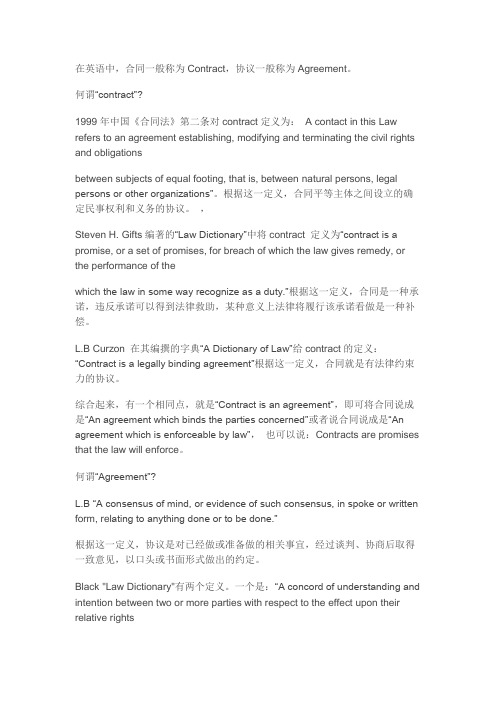
在英语中,合同一般称为Contract,协议一般称为Agreement。
何谓“contract”?1999年中国《合同法》第二条对contract定义为:A contact in this Law refers to an agreement establishing, modifying and terminating the civil rights and obligationsbetween subjects of equal footing, that is, between natural persons, legal persons or other organizations”。
根据这一定义,合同平等主体之间设立的确定民事权利和义务的协议。
,Steven H. Gifts编著的“Law Dictionary”中将contract 定义为“contract is a promise, or a set of promises, for breach of which the law gives remedy, or the performance of thewhich the law in some way recognize as a duty.”根据这一定义,合同是一种承诺,违反承诺可以得到法律救助,某种意义上法律将履行该承诺看做是一种补偿。
L.B Curzon 在其编撰的字典“A Dictionary of Law”给contract的定义:“Contract is a legally binding agreement”根据这一定义,合同就是有法律约束力的协议。
综合起来,有一个相同点,就是“Contract is an agreement”,即可将合同说成是“An agreement which binds the parties concerned”或者说合同说成是“An agreement which is enforceable by law”,也可以说:Contracts are promises that the law will enforce。
LEC学习材料-合同法

合同法CONTRACTSIn law, a contract is a binding legal agreement that is enforceable in a court of law or by binding arbitration. That is to say, a contract is an exchange of promises with a specific remedy for breach. Agreement is said to be reached when an offer capable of immediate acceptance is met with a "mirror image" acceptance (i.e., an unqualified acceptance). The parties must have the necessary capacity to contract and the contract must not be either trifling, indeterminate, impossible, or illegal. Breach of contract is recognized by the law and remedies can be provided.As long as the good or service provided is legal, any oral agreement between two parties can constitute a binding legal contract. The practical limitation to this, however, is that only parties to a written agreement have material evidence (the written contract itself) to prove the actual terms uttered at the time the agreement was struck. In daily life, most contracts can be and are made orally, such as purchasing a book or a sandwich. Sometimes written contracts are required by either the parties, or by statutory law within various jurisdiction for certain types of agreement, for example when buying a house or land.Contract formationIn common-law systems, the five key requirements for the creation of a contract are:1. offer and acceptance (agreement)2. consideration3. an intention to create legal relations4. legal capacity5. formalitiesOffer and acceptance analysis is a traditional approach in contract law used to determine whether an agreement exists between two parties. As a contract is an agreement, an offer is an indication by one person (the "offeror") to another (the "offeree") of the offeror's willingness to enter into a contract on certain terms without further negotiations. A contract is said to come into existence when acceptance of an offer (agreement to the terms in it) has been communicated to the offeror by the offeree.Treitel defines an offer as "an expression of willingness to contract on certain terms, made with the intention that it shall become binding as soon as it is accepted by the person to whom it isaddressed", the "offeree". An offer is a statement of the terms on which the offeror is willing to be bound.The "expression" referred to in the definition may take different forms, such as a letter, newspaper, fax, email and even conduct, as long as it communicates the basis on which the offeror is prepared to contract.Whether two parties have an agreement or a valid offer is an issue which is determined by the court using the Objective test (Smith v. Hughes). Therefore the "intention" referred to in the definition is objectively judged by the courts. In the English case of Smith v. Hughes the court emphasised that the important thing is not a party's real intentions but how a reasonable person would view the situation. This is due mainly to common sense as each party would not wish to breach his side of the contract if it would make him or her culpable to damages, it would especially be contrary to the principle of certainty and clarity in commercial contract and the topic of mistake and how it affects the contract. As a minimum requirement the conditions for an offer should include at least the following 4 conditions: Delivery date, price, terms of payment that includes the date of payment and detail description of the item on offer including a fair description of the condition or type ofservice. Without one of the minimum requirements of condition an offer of sale is not seen as a legal offer but rather seen as an advertisement.Acceptance is a final and unqualified expression of assent to the terms of an offer. It is no defense to an action based on a contract for the defendant to claim that he had not intended to be bound by the agreement, if his conduct demonstrated that he had.Rules of acceptanceThere are several rules dealing with the communication of acceptance:•The acceptance must be communicated: see Powell v Lee (1908) Prior to acceptance, an offer may be withdrawn.•An exception exists in the case of unilateral contracts, in which the offeror makes an offer to the world which can be accepted by some act. A classic instance of this is the case ofCarlill v. Carbolic Smoke Ball Co. [1892] 2 Q.B. 484 in which an offer was made to pay £100 to anyone who having boughtthe offeror's product and used it in accordance with the instructions nonetheless contracted influenza. The plaintiff did so and the court ordered payment of the £100. Heractions accepted the offer - there was no need to communicate acceptance. Typical cases of unilateral offers are advertisements of rewards (e.g., for the return of a lost dog).•An offer can only be accepted by the offeree, that is, the person to whom the offer is made.•An offeree is not usually bound if another person accepts the offer on his behalf without his authorization, the exceptions to which are found in the law of agency, where an agent may have apparent or ostensible authority, or the usual authority of an agent in the particular market, even if the principal did not realize what the extent of this authority was, and someone on whose behalf an offer has been purportedly accepted it may also ratify the contract within a reasonable time, binding both parties.•It may be implied from the construction of the contract that the offeror has dispensed with the requirement of communication of acceptance (called waiver of communication - which is generally implied in unilateral contracts): see also Re Selectmove Ltd [1994] BCC 349.•If the offer specifies a method of acceptance (such as by post or fax), acceptance must be by a method that is no lesseffective from the offeror's point of view than the method specified. The exact method prescribed may have to be used in some cases but probably only where the offeror has used very explicit words such as "by registered post, and by that method only": see Yates Building Co. Ltd v. R.J. Pulleyn & Sons (York) Ltd (1975) 119 Sol. Jo. 370.•Silence cannot be construed as acceptance: see Felthouse v.Bindley (1862) 142 ER 1037.•However, acceptance may be inferred from conduct.Vitiating FactorsThere are the factors affecting the validity of an otherwise effective contract. They include mistakes, misrepresentation, duress, undue influence and illegality.DischargeOnce it is determined that a party is under an immediate duty to perform, the duty to perform must be discharged. A contract may be discharged in one of the following ways:·By performance·By tender of performance·By frustration·By operation of law·By occurrence of condition subsequent·By illegality·By rescission·By novation·By cancellation·By release·By substituted contract·By accord and satisfaction·By account stated·By lapse·By effect of running of statute of limitationsBreach of contract is a legal concept in which a binding agreement or bargained-for exchange is not honored by one or more of the parties to the contract by non-performance orinterference with the other party's performance. If the party does not fulfill his contractual promise, or has given information to the other party that he will not perform his duty as mentioned in the contract or if by his action and conduct he seems to be unable to perform the contract, he is said to breach the contract.Remedies for Breach of Contract•Damages, which may include:o Compensatory damageso Punitive damageso Incidental damageso Liquidated damageso Nominal damages•Coercive reliefo Specific performanceo Injunctionso Restitutiono Account of profits【版权声明】《合同法CONTRACTS》的版权属于法律英语证书(LEC)全国统一考试委员会所有。
法律学英语词汇大全掌握法律原则与法律条文的专业术语
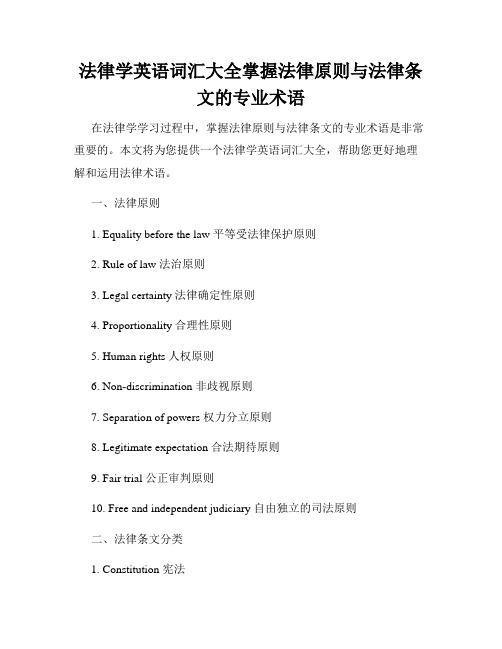
法律学英语词汇大全掌握法律原则与法律条文的专业术语在法律学学习过程中,掌握法律原则与法律条文的专业术语是非常重要的。
本文将为您提供一个法律学英语词汇大全,帮助您更好地理解和运用法律术语。
一、法律原则1. Equality before the law 平等受法律保护原则2. Rule of law 法治原则3. Legal certainty 法律确定性原则4. Proportionality 合理性原则5. Human rights 人权原则6. Non-discrimination 非歧视原则7. Separation of powers 权力分立原则8. Legitimate expectation 合法期待原则9. Fair trial 公正审判原则10. Free and independent judiciary 自由独立的司法原则二、法律条文分类1. Constitution 宪法2. Statute 法规3. Regulation 规章4. Directive 指令5. Treaty 条约6. Case law 案例法7. International law 国际法8. Civil law 民法9. Criminal law 刑法10. Administrative law 行政法三、刑事法术语1. Crime 犯罪2. Offense 违法行为3. Defendant 被告人4. Trial 审判5. Evidence 证据6. Conviction 定罪7. Punishment 刑罚8. Bail 保释9. Acquittal 宣告无罪10. Homicide 杀人罪四、合同法术语1. Contract 合同2. Offer 提议3. Acceptance 接受4. Consideration 对价5. Breach of contract 违约6. Damages 损害赔偿7. Termination 终止8. Force majeure 不可抗力9. Confidentiality 保密性10. Indemnity 赔偿五、民事法术语1. Tort 侵权2. Negligence 疏忽3. Liability 责任4. Compensation 补偿5. Injunction 禁令6. Plaintiff 原告7. Defendant 被告8. Breach of duty 违反职责9. Property rights 财产权10. Jurisdiction 管辖权六、知识产权法术语1. Patent 专利2. Trademark 商标3. Copyright 版权4. Intellectual property 知识产权5. Infringement 侵权6. Royalties 版权使用费7. Fair use 合理使用8. Piracy 盗版9. Trade secret 商业秘密10. License 许可证七、国际法术语1. Sovereignty 主权2. Diplomacy 外交3. Treaty 条约4. International organization 国际组织5. State 国家6. Territory 领土7. Jurisdiction 管辖权8. Human rights 人权9. Conflict resolution 冲突解决10. Diplomatic immunity 外交豁免权八、行政法术语1. Administrative agency 行政机关2. Administrative decision 行政决定3. Administrative procedure 行政程序4. Judicial review 司法审查5. Administrative discretion 行政自由裁量权6. Public interest 公共利益7. Administrative remedy 行政救济8. Administrative penalty 行政处罚9. Administrative contract 行政合同10. Administrative regulation 行政法规以上是一些常用的法律学英语词汇,希望对您的学习有所帮助。
法律英语:Contract&agreement 合同和协议 上

法律英语:Contract&agreement 合同和协议上A contract may be modified if the parties reach a consensus1 through consultation2.当事人协商一致即可以变更合同。
A person is not liable for debts contracted during his minority.一个人无须对他在未成年时期的合同债务承担责任。
A transaction between two parties ought not to operate to the disadvantage of a third.合约不约束第三人。
A contract cannot arise out of an illegal act.违法行为不能构成合约。
An acceptance once given cannot be revoked4 unless the offeror consents.除非要约人同意,承诺一经做出即不得撤回。
An acceptance is a statement made by the offeree indicating assent5 to an offer.承诺是受要约人同意要约的意思表示。
An offeror may withdraw an offer at any time before it has been accepted.在要约被受要约人接受以前,要约人可以随时撤回要约。
Any amendment6 to this contract shall become effective only by a written agreement by Patry A and Party B.对本合同的任何修改,只有经甲、乙双方签署书面协议后方能生效。
Any annex7 is the integral part of this contract.本合同一切附件均为本合同的有效组成部分。
职业英语词汇大全

职业英语词汇大全职业英语是指用英语进行职场交流和职业活动的语言。
在现代职场中,掌握职业英语词汇对于与外籍员工合作、拓展国际市场、提升职业素质都非常重要。
本文将为您提供职业英语词汇的全面介绍。
一、商务英语词汇1. Company structure 公司结构- Chief executive officer (CEO) 首席执行官- Human resources (HR) 人力资源- Sales and marketing 销售和市场营销- Finance and accounting 财务和会计- Research and development (R&D) 研发- Information technology (IT) 信息技术2. Business negotiations 商务谈判- Contract 合同- Agreement 协议- Terms and conditions 条款和条件- Price negotiation 价格谈判- Mutual benefit 互惠- Win-win situation 双赢局面3. Presentations and meetings 演讲和会议- Introduction 自我介绍- Agenda 议程- PowerPoint presentation 幻灯片演示- Q&A question and answer 问答环节- Minutes of meeting 会议记录4. International trade 国际贸易- Import 进口- Export 出口- Customs 海关- Shipping and logistics 运输和物流- Tariff 关税- Trade agreement 贸易协定二、医学英语词汇1. Medical specialties 医学专科- Cardiology 心脏病学- Dermatology 皮肤科- Pediatrics 儿科- Gynecology 妇科- Oncology 肿瘤学- Orthopedics 骨科2. Clinical procedures 临床程序- Diagnosis 诊断- Treatment 治疗- Surgery 手术- Medication 药物治疗- Rehabilitation 康复- Palliative care 安宁疗护3. Medical equipment 医疗设备- Stethoscope 听诊器- Blood pressure monitor 血压计- Electrocardiogram (ECG/EKG) 心电图仪- MRI scanner 核磁共振扫描仪- Ultrasound scanner 超声波扫描仪- X-ray machine X光机4. Medical terminology 医学术语- Anesthesia 麻醉- Biopsy 活检- Intensive care unit (ICU) 重症监护室- Rehabilitation therapy 康复治疗- Chemotherapy 化疗- Radiology 放射学三、工程英语词汇1. Civil engineering 土木工程- Construction 建筑- Structural design 结构设计- Bridge 桥梁- Tunnel 隧道- Highway 公路- Foundation 基础2. Electrical engineering 电气工程- Power generation 发电- Electric circuit 电路- Transformer 变压器- Generator 发电机- Circuit breaker 断路器- Electrical wiring 电气布线3. Mechanical engineering 机械工程- Machine design 机械设计- Manufacturing 制造- Robotics 机器人技术- Industrial automation 工业自动化- Fluid mechanics 流体力学- Thermodynamics 热力学4. Environmental engineering 环境工程- Pollution control 污染控制- Waste management 废物管理- Water treatment 水处理- Air quality 空气质量- Renewable energy 可再生能源- Sustainability 可持续性四、法律英语词汇1. Legal terms 法律术语- Lawsuit 诉讼- Defendant 被告- Plaintiff 原告- Evidence 证据- Verdict 裁决- Appeal 上诉2. Contract law 合同法- Offer and acceptance 出价和接受- Consideration 对价- Breach of contract 违约- Termination of contract 终止合同- Confidentiality clause 保密条款- Force majeure 不可抗力3. Intellectual property 知识产权- Patent 专利- Trademark 商标- Copyright 版权- Infringement 侵权- Royalties 版权费- Licensing 授权4. Corporate law 公司法- Shareholder 股东- Board of directors 董事会- Mergers and acquisitions (M&A) 兼并与收购- Corporate governance 公司治理- Shareholder resolution 股东决议- Annual general meeting (AGM) 年度股东大会以上只是职业英语词汇的一小部分,掌握这些词汇将有助于提高职业素质和在职场中更好地与他人沟通。
中英文版《中华人民共和国合同法》Contract Law of the People’s Republic of China
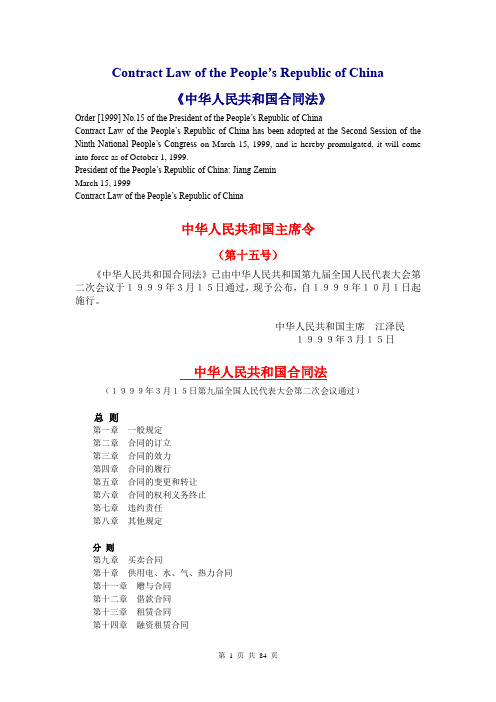
Contract Law of the People’s Republic of China《中华人民共和国合同法》Order [1999] No.15 of the President of the People’s Republic of ChinaContract Law of the People’s Republic of China has been adopted at the Second Session of the Ninth National People’s Congress on March 15, 1999, and is hereby promulgated, it will come into force as of October 1, 1999.President of the People’s Republic of China: Jiang ZeminMarch 15, 1999Contract Law of the People’s Republic of China中华人民共和国主席令(第十五号)《中华人民共和国合同法》已由中华人民共和国第九届全国人民代表大会第二次会议于1999年3月15日通过,现予公布,自1999年10月1日起施行。
中华人民共和国主席江泽民1999年3月15日中华人民共和国合同法(1999年3月15日第九届全国人民代表大会第二次会议通过)总则第一章一般规定第二章合同的订立第三章合同的效力第四章合同的履行第五章合同的变更和转让第六章合同的权利义务终止第七章违约责任第八章其他规定分则第九章买卖合同第十章供用电、水、气、热力合同第十一章赠与合同第十二章借款合同第十三章租赁合同第十四章融资租赁合同第十五章承揽合同第十六章建设工程合同第十七章运输合同第十八章技术合同第十九章保管合同第二十章仓储合同第二十一章委托合同第二十二章行纪合同第二十三章居间合同附则General Provisions总则Chapter 1 General Provisions第一章一般规定Article 1 This Law is enacted in order to protect the lawful rights and interests of the contracting parties, to maintain social and economic order, and to promote the process of socialist modernization.第一条【立法目的】为了保护合同当事人的合法权益,维护社会经济秩序,促进社会主义现代化建设,制定本法。
劳动合同法英语版
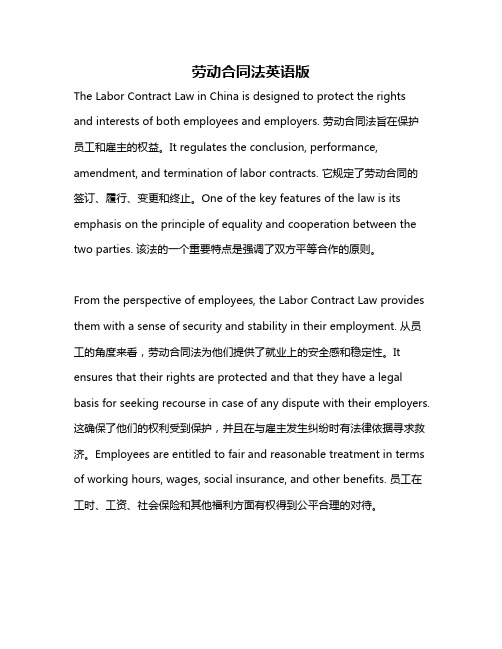
劳动合同法英语版The Labor Contract Law in China is designed to protect the rights and interests of both employees and employers. 劳动合同法旨在保护员工和雇主的权益。
It regulates the conclusion, performance, amendment, and termination of labor contracts. 它规定了劳动合同的签订、履行、变更和终止。
One of the key features of the law is its emphasis on the principle of equality and cooperation between the two parties. 该法的一个重要特点是强调了双方平等合作的原则。
From the perspective of employees, the Labor Contract Law provides them with a sense of security and stability in their employment. 从员工的角度来看,劳动合同法为他们提供了就业上的安全感和稳定性。
It ensures that their rights are protected and that they have a legal basis for seeking recourse in case of any dispute with their employers. 这确保了他们的权利受到保护,并且在与雇主发生纠纷时有法律依据寻求救济。
Employees are entitled to fair and reasonable treatment in terms of working hours, wages, social insurance, and other benefits. 员工在工时、工资、社会保险和其他福利方面有权得到公平合理的对待。
中华人民共和国劳动合同法英语版
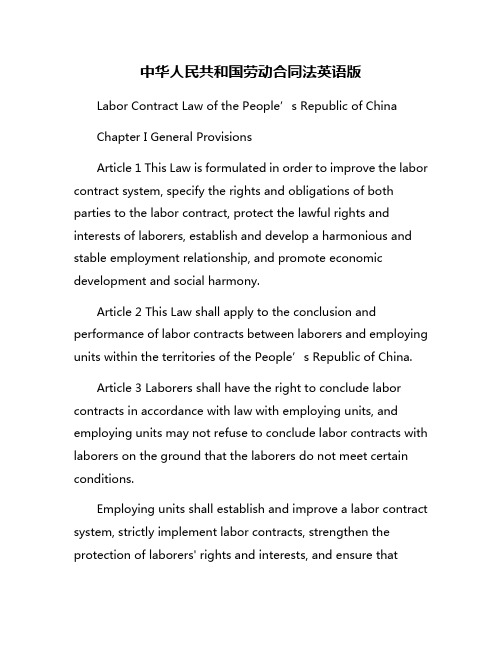
中华人民共和国劳动合同法英语版Labor Contract Law of the People’s Republic of ChinaChapter I General ProvisionsArticle 1 This Law is formulated in order to improve the labor contract system, specify the rights and obligations of both parties to the labor contract, protect the lawful rights and interests of laborers, establish and develop a harmonious and stable employment relationship, and promote economic development and social harmony.Article 2 This Law shall apply to the conclusion and performance of labor contracts between laborers and employing units within the territories of the People’s Republic of C hina.Article 3 Laborers shall have the right to conclude labor contracts in accordance with law with employing units, and employing units may not refuse to conclude labor contracts with laborers on the ground that the laborers do not meet certain conditions.Employing units shall establish and improve a labor contract system, strictly implement labor contracts, strengthen the protection of laborers' rights and interests, and ensure thatlaborers enjoy conditions of work in compliance with state regulations.Article 4 Labor contracts shall be concluded voluntarily through the consultation between laborers and employing units on an equal footing.When a laborer concludes a labor contract with an employing unit, the laborer may entrust a trade union to consult on his behalf.Article 5 Labor contracts shall be concluded in written form.An oral agreement reached by and between laborers and employing units to establish labor relations shall be deemed a labor contract. The employing unit shall then, within thirty days, provide the laborer with a written labor contract that fully specifies the matters agreed orally. If the employing unit fails to provide the laborer with the labor contract, the matters agreed upon orally shall be performed.Article 6 In concluding a labor contract, the lawful rights and interests and economic conditions of laborers shall be respected.Employing units may not force laborers to conclude labor contracts by means of deceit, coercion, or intimidation.Article 7 Labor contracts shall be performed in accordance with the principle of equality, voluntariness, fairness, and good faith.Article 8 Labor contracts shall include the following:(1) name, domicile, and legal representative or main person-in-charge of the employing unit;(2) name, domicile, resident identity card number or other valid identity certificate of the laborer;(3) term of the labor contract;(4) job description and place of work;(5) working hours, rest and leave, labor remuneration, social insurance, and other matters;(6) labor protection and working conditions;(7) other matters that should be included in the labor contract as required by laws and regulations.Article 9 A labor contract shall be concluded for a fixed term, a non-fixed term, or for a specified task.A labor contract concluded for a fixed term shall be held for no more than 10 years. When the term of a labor contract expires,and the laborer continuously works for the employing unit, the labor contract shall be deemed renewed on a non-fixed term basis.Article 10 An employing unit shall not stipulate in a labor contract that it may terminate the labor contract at will.Article 11 An employing unit shall not stipulate in a labor contract any provision that is less favorable to the laborer than the relevant laws and regulations.Chapter II Conclusion of Labor ContractsArticle 12 Laborers who conclude labor contracts with employing units shall meet the following conditions:(1) having full civil capacity;(2) having professional skills or expertise necessary for his job position;(3) having the physical capability necessary for his job position;(4) having other conditions prescribed by laws and administrative rules and regulations.Article 13 Laborers shall provide true information regarding their personal matters, professional skills or expertise, andphysical capability. Employing units shall not require laborers to provide false information.Article 14 Laborers and employing units shall conclude labor contracts in accordance with the principle of fairness, and may not breach any agreement to the disadvantage of the other party.Article 15 Employing units shall not restrict laborers in concluding labor contracts with other employing units to the disadvantage of laborers.Article 16 Employing units shall not conclude labor contracts with the employment of labor dispatch agencies to replace employment of laborers.Article 17 Employing units shall not employ child laborers.Article 18 Upon the conclusion of a labor contract, the employing unit shall provide the laborer with a copy of the labor contract. When the laborer requires, employing units shall provide a pay statement on a regular basis.Article 19 Employing units shall establish and improve a system for the filing of labor contracts.Chapter III Performance of Labor ContractsArticle 20 Employing units shall provide necessary working conditions for laborers to carry out their job duties and ensure labor protection in accordance with laws and regulations.Article 21 Employing units shall not demand that laborers work overtime, or work on their days of rest, in violation of the provisions of the state.Article 22 Employing units shall pay labor remuneration to laborers in full and on time, and shall not reduce or delay payment of labor remuneration without justifiable reasons.Article 23 Employing units shall provide social insurance for laborers in accordance with the law.Article 24 Laborers shall carry out their job duties in accordance with the labor contract, follow the employing unit's rules, and refrain from divulging trade secrets.Article 25 Laborers shall be entitled to protection of their lawful rights and interests in accordance with laws and regulations if employing units violate laws and regulations by reducing or delaying payment of labor remuneration, failing to provide labor protection, or unilaterally terminating a labor contract.Article 26 When a laborer is unable to work due to illness or non-work-related injury, the laborer shall provide certification issued by a medical institution at the same level.Article 27 Laborers shall not compete with the employing unit in breach of the labor contract. If a laborer breaches the labor contract by competing with the employing unit or leaving the employing unit, causing damage to the employing unit, the liability for compensation shall be borne in accordance.Chapter IV Modification and Termination of Labor ContractsArticle 28 Modifications to a labor contract shall be made through consultation between laborers and employing units.Article 29 Laborers may not refuse modifications to labor contracts proposed by employing units that comply with laws and regulations, industrial policies, and business conditions.Article 30 Employing units may not modify labor contracts with the employment of labor dispatch agencies to replace employment of laborers.Article 31 Labor contracts may be terminated under certain circumstances, including:(1) agreement by both parties;(2) the labor contract expires or both parties agree not to renew the contract;(3) the employing unit is dissolved, declared bankrupt, is ordered to shut down, or revokes its business license;(4) the employing unit formulates the labor contract by fraud or coercion;(5) the employing unit severely breaches laws and regulations, or the labor contract, causing irreparable harm to the laborer’s well-being.Article 32 When a labor contract is terminated, employing units shall issue a termination certificate or a service certificate and pay compensation in accordance with laws and regulations.Chapter V Supervision and InspectionArticle 33 Supervision and inspection of labor contract performance shall be conducted by labor and social security administrative departments in accordance with the law.Article 34 Laborers and trade unions shall have the right to report violations of laws and regulations regarding labor contracts to the relevant authorities.Article 35 Employing units shall cooperate with the relevant authorities in supervision and inspection of labor contract performance, accept supervision and inspection, and provide necessary materials and information.Article 36 The state shall establish a system of rewards for those who make important contributions and render meritorious services in the supervision and inspection of labor contract performance.Chapter VI Legal LiabilityArticle 37 If employing units violate the provisions of this Law in concluding, performing, modifying, or terminating labor contracts, they shall bear legal liability in accordance with the law.Article 38 If laborers violate the provisions of this Law, the employing unit may criticise, educate, or discipline them in accordance with the law.Article 39 If employing units’ violations of rights and interests of laborers lead to conflicts that may be resolved through mediation, both parties may apply for mediation from a labor dispute mediation institution.Article 40 If employing units’ violations of r ights and interests of laborers cause damage to laborers, employing units shall bear liability for compensation in accordance with the law.Article 41 If laborers’ violations of the provisions of this Law cause damage to employing units, laborers shall bear liability for compensation in accordance with the law.Chapter VII Supplementary ProvisionsArticle 42 This Law shall take effect on January 1, 2008.Article 43 The Labor Contract Law of the People’s Republic of China formulated by the Standing Committee of the National People's Congress on June 29, 1994, shall be repealed upon the implementation of this Law.以上为《中华人民共和国劳动合同法》全文的英语译文。
合同相关英语
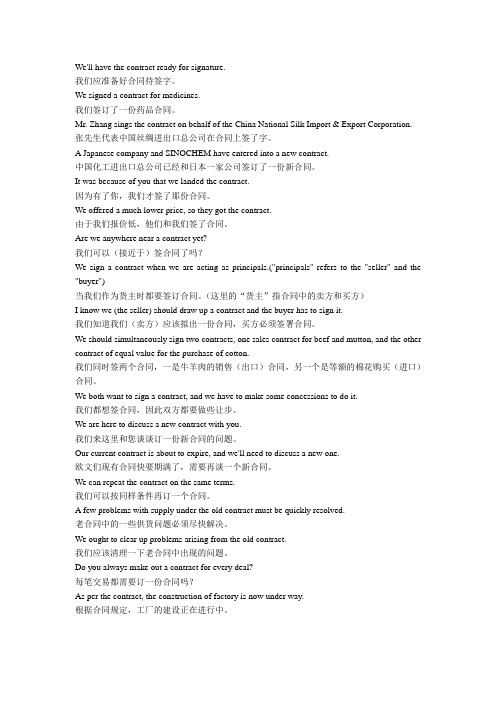
We'll have the contract ready for signature.我们应准备好合同待签字。
We signed a contract for medicines.我们签订了一份药品合同。
Mr. Zhang sings the contract on behalf of the China National Silk Import & Export Corporation.张先生代表中国丝绸进出口总公司在合同上签了字。
A Japanese company and SINOCHEM have entered into a new contract.中国化工进出口总公司已经和日本一家公司签订了一份新合同。
It was because of you that we landed the contract.因为有了你,我们才签了那份合同。
We offered a much lower price, so they got the contract.由于我们报价低,他们和我们签了合同。
Are we anywhere near a contract yet?我们可以(接近于)签合同了吗?We sign a contract when we are acting as principals.("principals" refers to the "seller" and the "buyer")当我们作为货主时都要签订合同。
(这里的“货主”指合同中的卖方和买方)I know we (the seller) should draw up a contract and the buyer has to sign it.我们知道我们(卖方)应该拟出一份合同,买方必须签署合同。
We should simultaneously sign two contracts, one sales contract for beef and mutton, and the other contract of equal value for the purchase of cotton.我们同时签两个合同,一是牛羊肉的销售(出口)合同,另一个是等额的棉花购买(进口)合同。
Contract与Agreement的区别
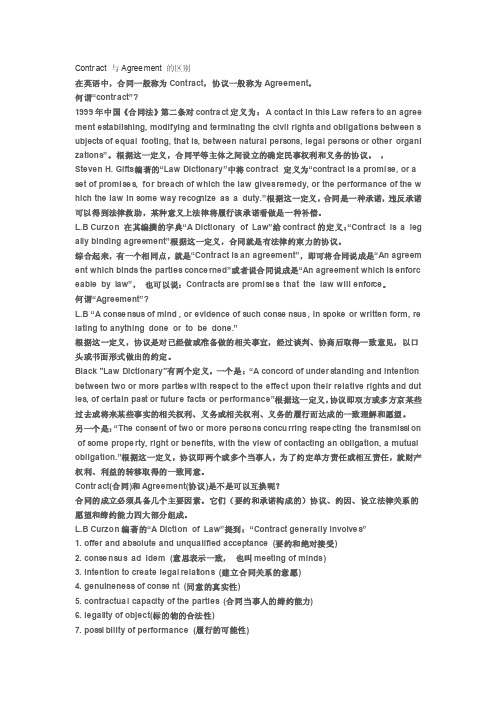
Contra ct 与 Agreem ent 的区别在英语中,合同一般称为Contr act,协议一般称为Agree ment。
何谓“contra ct”?1999年中国《合同法》第二条对co ntrac t定义为: A contac t in this Law refers to an agreement establ ishin g, modify ing and termin ating the civilrights and obliga tions betwee n s ubjec ts of equalfootin g, that is, betwee n natura l person s, legalperson s or otherorgani zatio ns”。
根据这一定义,合同平等主体之间设立的确定民事权利和义务的协议。
,Steven H. Gifts编著的“LawDictio nary”中将cont ract定义为“contra ct is a promis e, or a set of promis e s, for breach of whichthe law givesremedy, or the perfor mance of the w hichthe law in some way recogn izeasaduty.”根据这一定义,合同是一种承诺,违反承诺可以得到法律救助,某种意义上法律将履行该承诺看做是一种补偿。
L.B Curzon在其编撰的字典“ADictio naryofLaw”给contr act的定义:“Contra ct is a leg all y bindin g agreem ent”根据这一定义,合同就是有法律约束力的协议。
法律英语合同法高频词汇

法律英语合同法高频词汇Legal English Vocabulary for Contract Law.Contract law, being a crucial aspect of legal practice, is rich in terminology and jargon. This article aims to provide an overview of some of the high-frequency vocabulary used in the field of contract law, focusing on legal English terminology.1. Contract.A binding agreement between two or more parties that is enforceable by law.2. Party.An individual or entity involved in a contract.3. Offer.A proposal made by one party to another, stating their willingness to enter into a contract under certain terms.4. Acceptance.A positive response to an offer, indicating the willingness of the recipient to be bound by the terms of the contract.5. Consideration.Something valuable exchanged between the parties as a 诱因 or inducement to enter into the contract.6. Intention to Create Legal Relations.The intention of the parties to be bound by legally enforceable obligations.7. Capacity to Contract.The legal ability of a party to enter into a contract.This includes being of sound mind, having reached the ageof majority, and not being under any legal disqualification.8. Void Contract.A contract that is null and void from the outset, meaning it has no legal effect.9. Voidable Contract.A contract that can be annulled or set aside by one or more parties due to certain defects or irregularities.10. Breach of Contract.The failure of a party to perform their obligations under the contract.11. Damages.Compensation awarded to a party for losses suffereddue to a breach of contract.12. Force Majeure.An event or circumstance that is unforeseeable, unavoidable, and beyond the control of the parties, which prevents the performance of a contract.13. Fraud.Deceit or misrepresentation made by one party to another, inducing them to enter into a contract.14. Misrepresentation.A false statement of fact or law made by one party to another, either innocently, negligently, or fraudulently, which induces the other party to enter into a contract.15. Duress.The use of undue pressure or coercion by one party to induce another to enter into a contract.16. Unconscionable Contract.A contract that is so unfair or one-sided as to be considered unenforceable by law.17. Liquidated Damages.A pre-estimated amount of money agreed upon by the parties as compensation for a breach of contract, rather than calculating the actual losses suffered.18. Penalty Clause.A clause in a contract that imposes a punishment on a party for breaching the contract, which is intended to enforce the contract's terms.19. Breach of Warranty.The failure of a party to fulfill a warranty or guarantee made in the contract.20. Contractual Obligation.A duty or responsibility owed by a party to another under the terms of the contract.21. Performance.The fulfillment of the obligations set out in a contract by the parties.22. Termination of Contract.The ending of a contract either by agreement between the parties or due to a breach or other legal grounds.23. Third-Party Rights.Rights that arise in favor of a third party who is not a direct party to the contract but who is affected by its terms or performance.24. Assignment of Contract.The transfer of rights and obligations under a contract by one party to another party.25. Novation.The substitution of a new contract for an existing contract, with the consent of all parties.This list provides a snapshot of some of the key vocabulary used in contract law. However, it is important to note that contract law is a vast and complex field, and the vocabulary used can vary depending on the jurisdiction and the specific circumstances of each case. Therefore, it is always advisable to consult legal experts and professional legal resources when dealing with contract law matters.。
何家弘 法律英语 第九章 合同法 英汉对照
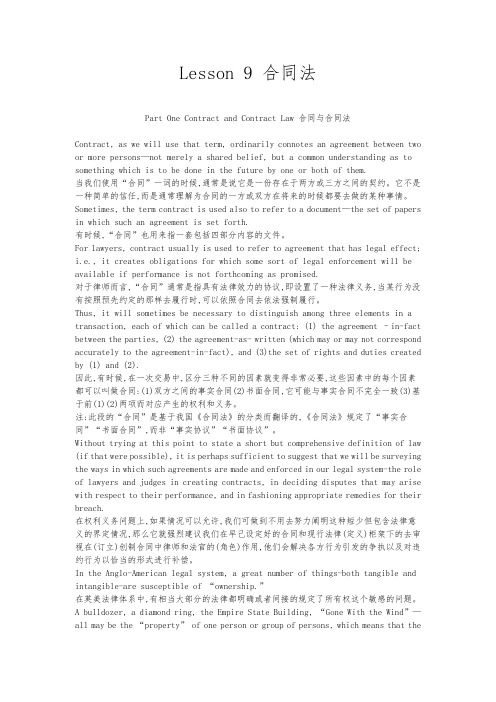
Lesson 9 合同法Part One Contract and Contract Law 合同与合同法Contract, as we will use that term, ordinarily connotes an agreement between two or more persons—not merely a shared belief, but a common understanding as to something which is to be done in the future by one or both of them.当我们使用“合同”一词的时候,通常是说它是一份存在于两方或三方之间的契约。
它不是一种简单的信任,而是通常理解为合同的一方或双方在将来的时候都要去做的某种事情。
Sometimes, the term contract is used also to refer to a document—the set of papers in which such an agreement is set forth.有时候,“合同”也用来指一套包括四部分内容的文件。
For lawyers, contract usually is used to refer to agreement that has legal effect;i.e., it creates obligations for which some sort of legal enforcement will be available if performance is not forthcoming as promised.对于律师而言,“合同”通常是指具有法律效力的协议,即设置了一种法律义务,当某行为没有按照预先约定的那样去履行时,可以依照合同去依法强制履行。
Thus, it will sometimes be necessary to distinguish among three elements in a transaction, each of which can be called a contract: (1) the agreement –in-fact between the parties, (2) the agreement-as- written (which may or may not correspond accurately to the agreement-in-fact), and (3)the set of rights and duties created by (1) and (2).因此,有时候,在一次交易中,区分三种不同的因素就变得非常必要,这些因素中的每个因素都可以叫做合同:(1)双方之间的事实合同(2)书面合同,它可能与事实合同不完全一致(3)基于前(1)(2)两项而对应产生的权利和义务。
值得一读:contract与agreement区别

值得一读:contract与agreement区别Contract 与Agreement的有无区别?在英语中,合同一般称为Contract,协议一般称为Agreement。
下面分别进行讲解。
第一部分、何谓“Contract”?1999年中国《合同法》第二条对contract定义为:A contact in t his Law refers to an agreement establishing, modifying and terminating the civil rights and obligations between subjects of equal footing, that is ,between natural persons, legal persons or other organizations. 根据这一定义,合同平等主体之间设立的确定民事权利和义务的协议。
Steven H. Gifts编著的“Law Dictionary”中将contract 定义为“contract is a promise, or a set of promises, for breach of which the law gives remedy, or the performance of the which the law in some way recognize as a duty.”根据这一定义,合同是一种承诺,违反承诺可以得到法律救助,某种意义上法律将履行该承诺看做是一种补偿。
L.B Curzon 在其编撰的字典“A Dictionary of Law”给contract的定义:“Contract is a legally binding agreement”根据这一定义,合同就是有法律约束力的协议。
综合起来,有一个相同点,就是“Contract is an agreement”,即可将事同说成是“An agreement which binds the parties concerned”或者说成是“An agreement which is enforceable by law”,也可以说:Contracts are promises that the law will enforce。
法律英语词汇

法律英语词汇在当今全球化的时代,法律英语作为一种重要的专业英语,被广泛应用于国际法律交流和合作中。
因此了解和掌握一些常见的法律英语词汇是每位法律从业者的基本要求。
本文将从不同领域的法律英语词汇出发,为读者提供一份简要的参考。
一、合同法1. Contract - 合同2. Offer - 出价3. Acceptance - 接受4. Consideration - 对价5. Breach of contract - 违约6. Damages - 赔偿7. Termination - 终止8. Force majeure - 不可抗力9. Arbitration - 仲裁10. Jurisdiction - 管辖权二、刑法1. Crime - 犯罪2. Offense - 罪行3. Guilty - 有罪4. Innocent - 无辜5. Evidence - 证据6. Attorney - 律师7. Bail - 保释金8. Trial - 审判9. Verdict - 裁决10. Sentence - 判决三、知识产权法1. Copyright - 版权2. Patent - 专利3. Trademark - 商标4. Infringement - 侵权5. Royalties - 版权费6. Intellectual property - 知识产权7. Fair use - 合理使用8. Injunction - 禁令9. License - 许可10. Trade secret - 商业秘密四、劳动法1. Employee - 雇员2. Employer - 雇主3. Labor contract - 劳动合同4. Minimum wage - 最低工资5. Overtime pay - 加班费6. Discrimination - 歧视7. Harassment - 骚扰8. Unemployment benefits - 失业救济金9. Collective bargaining - 集体谈判10. Work injury compensation - 劳动争议五、国际法1. Treaty - 条约2. Diplomacy - 外交3. Sovereignty - 主权4. United Nations - 联合国5. International Court of Justice - 国际法庭6. Human rights - 人权7. Humanitarian law - 人道主义法律8. Peacekeeping - 维和9. Sanctions - 制裁10. War crime - 战争罪六、民事诉讼1. Plaintiff - 原告2. Defendant - 被告3. Complaint - 控诉4. Pleading - 辩词5. Judgment - 判决书6. Appeal - 上诉7. Discovery - 调查8. Subpoena - 传票9. Mediation - 调解10. Settlement - 和解总结:了解法律英语词汇不仅有助于提高法律专业的英语水平,也为国际法律领域的合作和交流提供了便利。
大一上法律英语知识点
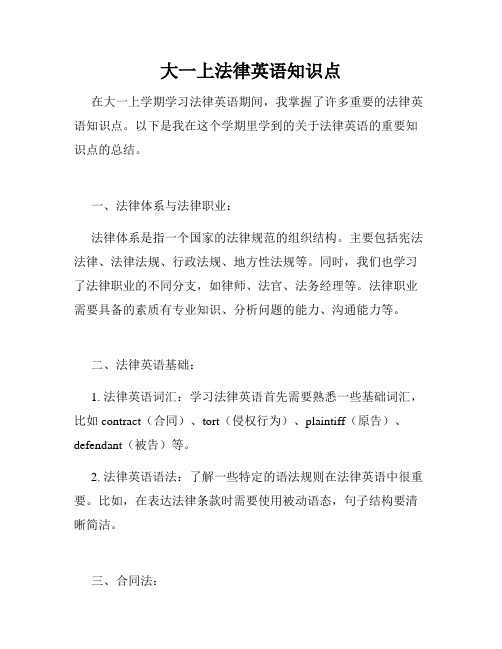
大一上法律英语知识点在大一上学期学习法律英语期间,我掌握了许多重要的法律英语知识点。
以下是我在这个学期里学到的关于法律英语的重要知识点的总结。
一、法律体系与法律职业:法律体系是指一个国家的法律规范的组织结构。
主要包括宪法法律、法律法规、行政法规、地方性法规等。
同时,我们也学习了法律职业的不同分支,如律师、法官、法务经理等。
法律职业需要具备的素质有专业知识、分析问题的能力、沟通能力等。
二、法律英语基础:1. 法律英语词汇:学习法律英语首先需要熟悉一些基础词汇,比如contract(合同)、tort(侵权行为)、plaintiff(原告)、defendant(被告)等。
2. 法律英语语法:了解一些特定的语法规则在法律英语中很重要。
比如,在表达法律条款时需要使用被动语态,句子结构要清晰简洁。
三、合同法:合同法是法律英语中一个重要的领域,它规范了合同的成立、履行和解除等方面。
在学习合同法时,我们需要了解以下内容:1. 合同的要素:合同的要素包括合同的主体、合同的内容、合同的形式等。
当合同中缺少任何一个要素时,合同可能无效。
2. 合同的履行:了解合同的履行过程、履行的方式,以及违约责任等。
3. 不当竞争禁止:学习了解竞业禁止协议的法律规定,以及企业之间在竞争方面的权利与义务等。
四、知识产权法:知识产权法保护创意和创新,以鼓励人们在各个领域中进行研究和创作。
以下是知识产权法的一些要点:1. 版权法:了解版权的定义、著作权的保护期限,以及侵权行为的法律后果等。
2. 商标法:学习商标的注册过程、商标的保护范围,以及商标权的侵权行为等。
3. 专利法:了解专利的种类、专利权的取得方式,以及专利的侵权认定等。
五、争议解决:1. 诉讼程序:了解民事诉讼的一般程序,如起诉、答辩、举证等。
2. 仲裁程序:了解仲裁的特点、仲裁协议的要素,以及仲裁结果的强制执行等。
六、国际商法:国际商法规范了跨国商业活动中的法律关系。
在学习国际商法时,需要了解以下方面:1. 国际货物销售合同:了解国际货物销售合同的成立、履行和争议解决等方面。
- 1、下载文档前请自行甄别文档内容的完整性,平台不提供额外的编辑、内容补充、找答案等附加服务。
- 2、"仅部分预览"的文档,不可在线预览部分如存在完整性等问题,可反馈申请退款(可完整预览的文档不适用该条件!)。
- 3、如文档侵犯您的权益,请联系客服反馈,我们会尽快为您处理(人工客服工作时间:9:00-18:30)。
合同法英语术语串讲
合同:contract
意思表示:intention
合意:mutual agreement
原则:平等,自愿,公平,诚实信用Principles: legally equal status, voluntarily, fairness, good faith
具有法律约束力:legally binding
合同的订立:entry into a contract
合同的缔结:conclusion of a contract
合同条款:clause, terms
要约:offer
要约邀请:invitation to offer
要约人:offeror
受要约人:offeree
要约生效:effectiveness of offer
要约撤销:withdrawal of offer
要约撤回:revocation of offer
要约失效:extinguishment of offer
承诺:acceptance
合同的成立:establishment of a contract
实质变更:substantial modification
格式条款:standard terms
无效:void
合同的效力:validity of a contract
合同的履行:performance of a contract 债权人:obligee
债务人:obligor
同时履行:simultaneous performance 先履行:consecutive performance 中止履行:suspension of performance 拒绝履行:reject performance 部分履行:partial performance
代位权:subrogation
撤销权:cancellation right
抗辩:defence
合同的变更:modification of contract 合同的转让:assignment of contract
合同终止:termination of a contract
合同的解除:rescind a contract
不可抗力:force majure
迟延履行:delayed performance
不能履行:impossible to perform
抵消:set-off
提存:lodge
免除:release/exemption
混同:merger
违约责任:liability of breach of contract
预期违约:anticipatory breach
继续履行:continue to perform (obligations) 补救措施:remedy 赔偿损失:make compensation
金钱之债:monetary specific performance
非金钱之债:non-monetary specific performance
违约金:liquidated damages/breach-of-contract damages
定金:deposit
损害赔偿金:damages
诉讼时效:time limit for action
买卖合同:sales contracts / sell and purchase contracts 所有权转移:transfer of ownership
交付:delivery
供用电、水、气、热力合同:contracts for
supply and use of electricity, water, gas and heat
赠与合同:donation contracts
借款合同:loan contracts
租赁合同:lease contracts
融资租赁合同:financial leasing contracts
承揽合同:contracts for work
建设工程合同:contracts for construction project
运输合同:contracts for transportation
技术合同:contracts for technology
保管合同:contracts for storage
仓储合同:contracts for warehousing
委托合同:commission contracts
行纪合同:brokerage contracts
居间合同:intermediation contracts。
